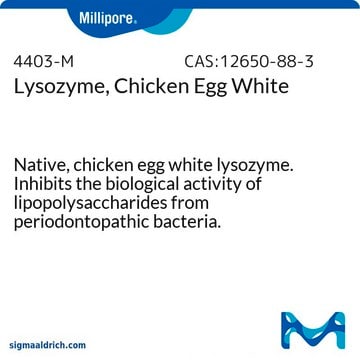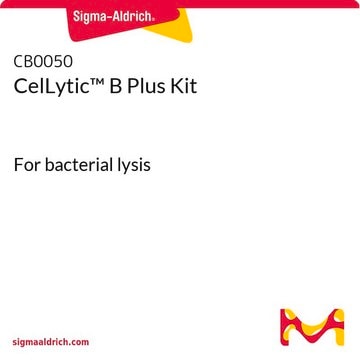L3790
Lysozyme from chicken egg white
10 mg/mL
Synonym(s):
Mucopeptide N-acetylmuramoylhydrolase, Muramidase
Sign Into View Organizational & Contract Pricing
All Photos(1)
About This Item
CAS Number:
MDL number:
UNSPSC Code:
12352204
NACRES:
NA.56
Recommended Products
biological source
chicken egg white
Quality Level
form
liquid
mol wt
single-chain 14.3 kDa
concentration
≥400000 units/mL
10 mg/mL
technique(s)
cell based assay: suitable
suitability
suitable for cell lysis
UniProt accession no.
application(s)
cell analysis
shipped in
wet ice
storage temp.
−20°C
Gene Information
chicken ... LYZ(396218)
Looking for similar products? Visit Product Comparison Guide
General description
Lysosyme is an enzyme found in egg white that breaks down the cell walls in bacteria enhancing the efficiency of DNA and protein extraction.
Application
Enzyme breaks down the cell walls of bacteria; used to prepare spheroplasts.
Suitable for the purification of both DNA and protein from bacteria.
Biochem/physiol Actions
Lysozyme hydrolyzes β(1→4) linkages between N-acetylmuramic acid and N-acetyl-D-glucosamine residues in peptidoglycan and between N-acetyl-D-glucosamine residues in chitodextrin. Gram-positive cells are quite susceptible to this hydrolysis as their cell walls have a high proportion of peptidoglycan. Gram-negative bacteria are less susceptible due to the presence of an outer membrane and a lower proportion of peptidoglycan. However, these cells may be hydrolyzed in the presence of EDTA that chelates metal ions in the outer bacterial membrane.
The enzyme is active over a broad pH range (6.0 to 9.0). At pH 6.2, maximal activity is observed over a wider range of ionic strengths (0.02 to 0.100 M) than at pH 9.2 (0.01 to 0.06 M).
The enzyme is active over a broad pH range (6.0 to 9.0). At pH 6.2, maximal activity is observed over a wider range of ionic strengths (0.02 to 0.100 M) than at pH 9.2 (0.01 to 0.06 M).
Suitability
Tested for suitability with CelLytic™ B in protein extraction from bacteria.
Unit Definition
One unit will lyse 0.4 μg of Micrococcus lysodeikticus per minute by turbidimetric detection at 600 nm when suspended in buffer at pH 8.0 at 37 °C.
Physical form
Ready to use solution:10 mg/mL lysozyme in 25 mM sodium acetate pH 4.5 with 50% glycerol.
Solution in 50% glycerol, 25 mM Sodium Acetate
Legal Information
CelLytic is a trademark of Sigma-Aldrich Co. LLC
Signal Word
Danger
Hazard Statements
Precautionary Statements
Hazard Classifications
Resp. Sens. 1
Storage Class Code
10 - Combustible liquids
WGK
WGK 2
Flash Point(F)
Not applicable
Flash Point(C)
Not applicable
Personal Protective Equipment
dust mask type N95 (US), Eyeshields, Gloves
Choose from one of the most recent versions:
Already Own This Product?
Find documentation for the products that you have recently purchased in the Document Library.
Customers Also Viewed
Phase-sensitive spatially-modulated surface plasmon resonance polarimetry for detection of biomolecular interactions
Patskovsky,S et al.
Sens. Actuators, 133 (2), 628-631 (2008)
Michael G Drage et al.
Cellular immunology, 258(1), 29-37 (2009-04-14)
Mycobacterium tuberculosis (Mtb) signals through Toll-like receptor 2 (TLR2) to regulate antigen presenting cells (APCs). Mtb lipoproteins, including LpqH, LprA, LprG and PhoS1, are TLR2 agonists, but their co-receptor requirements are unknown. We studied Mtb lipoprotein-induced responses in TLR2(-/-), TLR1(-/-)
Daimon P Simmons et al.
Journal of immunology (Baltimore, Md. : 1950), 185(4), 2405-2415 (2010-07-28)
Dendritic cells (DCs) cross process exogenous Ags and present them by class I MHC (MHC-I) molecules to CD8(+) T cells specific for Ags from viruses and bacteria such as Mycobacterium tuberculosis. Unmethylated CpG DNA signals through TLR9 to induce type
Benjamin S Waldman et al.
Cell, 180(2), 359-372 (2020-01-21)
Toxoplasma gondii chronically infects a quarter of the world's population, and its recrudescence can cause life-threatening disease in immunocompromised individuals and recurrent ocular lesions in the immunocompetent. Acute-stage tachyzoites differentiate into chronic-stage bradyzoites, which form intracellular cysts resistant to immune
Patricia Chastagner et al.
EMBO molecular medicine, 12(12), e12025-e12025 (2020-11-13)
Tau accumulation in the form of neurofibrillary tangles in the brain is a hallmark of tauopathies such as Alzheimer's disease (AD). Tau aggregates accumulate in brain regions in a defined spatiotemporal pattern and may induce the aggregation of native Tau
Our team of scientists has experience in all areas of research including Life Science, Material Science, Chemical Synthesis, Chromatography, Analytical and many others.
Contact Technical Service








